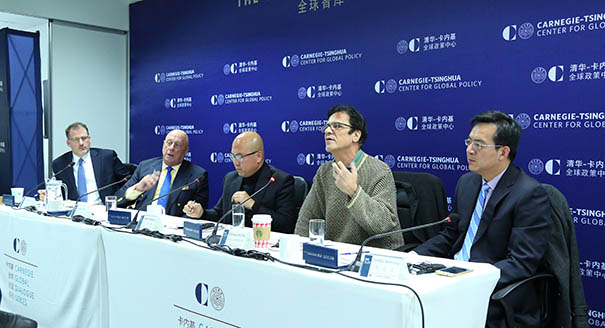Registration
You will receive an email confirming your registration.
Much has changed in the U.S.-China bilateral relationship since Donald Trump’s visit to Beijing last November. The Trump administration has characterized China as a revisionist power, alleged Chinese interference in American democracy, and levied sanctions on the People’s Liberation Army over its purchase of military equipment from Russia. As frictions between the two nations rise, can leaders find ways to resolve security and trade disputes and establish a framework to manage competition in order to avoid zero-sum conflict?
Two days after the U.S. midterm elections, Carnegie–Tsinghua Center Director Paul Haenle moderated a discussion with American and Chinese scholars on the trajectory of the U.S.-China relationship.
This panel was the second of the Carnegie Global Dialogue Series 2018-2019 and cosponsored by the China Institutes of Contemporary International Relations.
DISCUSSION HIGHLIGHTS
- Bipartisan Consensus on China: The panelists agreed that the midterm elections would likely not directly impact U.S.-China relations. Although Trump tried to divert the public’s attention from Russia to China before the midterms, both the Democrats and Republicans campaigned on domestic issues. Moreover, the panelists emphasized that concerns about China do not distinguish President Trump’s administration and the Republicans from the Democrats, as there is bipartisan support for adopting a tougher stance on China. However, the results of the elections may still impact bilateral relations between China and the United States indirectly.
- The Trump Factor: The discussants stated that one of the main drivers of U.S.-China misunderstanding is President Trump’s personal inexperience in politics, as well as the lack of experienced policymakers surrounding him. The administration has failed in building a strategic structure for its China policies and makes contradictory demands to Chinese negotiators. In addition, some panelists stated that no trade war agreement will be good enough for the Trump administration, and that the real goal is to decouple the Chinese and American economies. The discussants concluded that Trump’s main principle is “less talk, more action,” no matter if the action is productive or not.
- First Bilateral Crisis Not Caused by an Incident: China-U.S. relations have gone through several crises in the past, but the one the world is currently witnessing is the first that has sprung up organically and without a precipitating incident. This proves that there are structural issues in the bilateral relationship that need to be resolved in the spheres not only of trade, but also foreign direct investment, technology transfers, and education, among others.
Chinese Foreign Policy Has Become More Proactive: Chinese foreign policy is based on fundamental principles that vary little from one administration to another. While Chinese leaders have held slightly different ideological approaches to development, there have been few significant changes in China’s overall foreign policy since reform and opening-up, the discussants said. However, some noted that Chinese foreign policy is becoming more proactive and that rivalry is the new normal for U.S.-China bilateral relations. Despite the increased tensions, the U.S. relationship is still China’s number one priority.
Development Model Adjustments and Globalization Issues: Some of the panelists drew attention to two parallel processes that are causing shifts in U.S. relations: China’s adjusting development model and an anti-globalization wave. The panelists insisted that trade tensions are a product of the United States choosing to reassert its national economic sovereignty over furthering global integration. At the same time, China is having economic difficulties due not only to the trade war, but also to its surging domestic debt levels and the difficulties in switching from investment-led economic growth to a consumption-led process. However, China remains a champion of increasing globalization.
Paul Haenle
Paul Haenle holds the Maurice R. Greenberg Director’s Chair at the Carnegie–Tsinghua Center for Global Policy based at Tsinghua University in Beijing. His research focuses on Chinese foreign policy and U.S.-China relations.
Douglas H. Paal
Douglas H. Paal is vice president for studies at the Carnegie Endowment for International Peace. He previously served as vice chairman of JPMorgan Chase International (2006-2008) and was an unofficial U.S. representative to Taiwan as director of the American Institute in Taiwan (2002-2006).
Wang Honggang
Wang Honggang is director of the Institute of American Studies at the China Institutes of Contemporary International Relations (CICIR).
Michael Pettis
Michael Pettis is a nonresident senior fellow in the Carnegie Asia Program based in Beijing. An expert on China’s economy, Pettis is professor of finance at Peking University’s Guanghua School of Management, where he specializes in Chinese financial markets.
Zhang Wenzong
Zhang Wenzong is director of the American Politics Research Office in the Institute of American Studies at CICIR.
